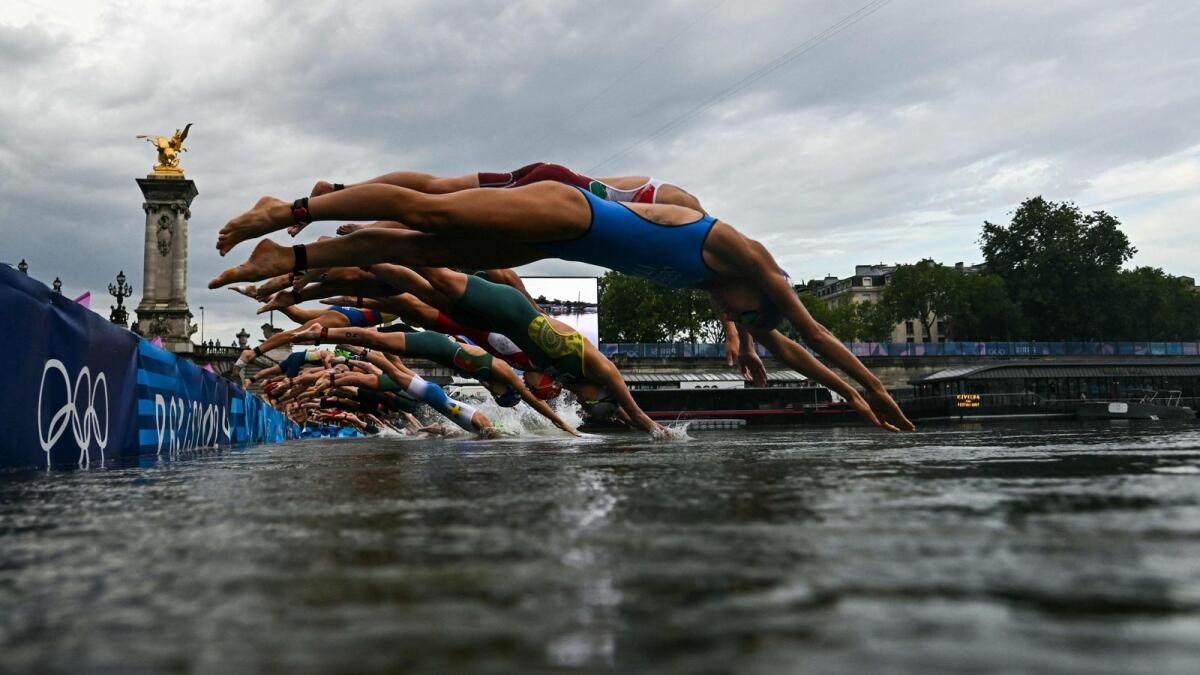France’s Cassandre Beaugrand clinched the gold medal in the women’s triathlon event at the Paris Olympics, showcasing her talent in front of an excited crowd. The decision to host the swim stage of the race in the Seine proved to be a success after facing uncertainty in the days leading up to the event. The triathlon, a significant part of the Paris Games, began and ended at the Alexandre III bridge in the heart of the city, offering athletes a scenic route through Paris, passing iconic landmarks such as the Champs-Elysees and Musee d’Orsay.
After failing water quality tests, the men’s triathlon was rescheduled to take place immediately after the women’s race on Wednesday. The female athletes dove into the Seine amidst the easing rainfall, providing a breathtaking view as they navigated their way through central Paris on their bikes and through the run stage. Despite the wet conditions, a few athletes encountered slips on the cobblestones of the Champs-Elysees during the cycling segment. Ultimately, it was World number one Beaugrand who broke away in the final lap of the running phase to secure victory, with Switzerland’s Julie Derron and Britain’s Beth Potter claiming silver and bronze, respectively.
The decision to proceed with the races in the Seine offered a sense of relief to teams, athletes, and Parisian authorities who aimed to showcase a clean and swimmable river as a legacy of the Games. The variability of water quality in the river posed a challenge, especially with rising levels of infection-causing bacteria like E. coli after rainfall. Despite the risks, the technical director of France’s triathlon federation expressed joy at the news of racing proceeding, allowing the participants to focus entirely on competition mode. Organizers evaluated river samples and weather conditions to ensure the safety of the athletes, giving the green light for the triathlon events to continue.
Despite overnight rain and unfavorable racing conditions, the women’s triathlon commenced with 55 athletes from 34 countries competing in the challenging course along the Seine. The swift analysis of water samples deemed the river compliant, prompting Paris 2024 and World Triathlon to proceed with the competitions. With significant investment in wastewater infrastructure to improve water quality, Paris has taken extensive measures to ensure the safety of the athletes and residents. The postponement of the men’s race on Tuesday due to water quality concerns had sparked criticism from some athletes, questioning the prioritization of their health in the decision-making process.
In conclusion, Cassandre Beaugrand’s victory in the women’s triathlon at the Paris Olympics highlighted her skills and resilience against tough competition. The successful hosting of the swim stage in the Seine showcased the beauty of Paris while overcoming challenges related to water quality. The determination to provide a safe and memorable experience for athletes and spectators underscored the efforts made by Paris authorities in ensuring a swimmable river as a lasting legacy of the Games. Despite initial setbacks and concerns, the triathlon events proceeded smoothly, leaving a positive impact on participants and audiences alike.










